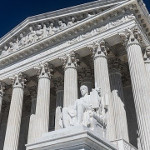Eversheds Sutherland is pleased to announce that the TCPA litigation and counseling subgroup of the firm’s Litigation Practice Group has published its 6th annual REDIAL: 2019 TCPA Year-in-Review – Analysis of Critical Issues and Trends in TCPA Compliance and Litigation. REDIAL reflects the team’s thought leadership and in-depth analysis of significant Telephone Consumer Protection Act (TCPA) court cases, regulatory developments and compliance issues.
“In 2019, the insurance, financial services, energy and telecommunications sectors, among many others, were all uniquely affected by the TCPA,” said Lewis S. Wiener, US partner and leader of Eversheds Sutherland’s TCPA practice. “Keeping up with developments in the TCPA area has never been more important. At the start of 2019, there was no more TCPA plaintiff-friendly jurisdiction than the 11th Circuit. By the end of the year, the 11th Circuit had become the least plaintiff-friendly jurisdiction. As TCPA cases continue to be filed at a record rate, compliance becomes more important for businesses in every sector. REDIAL and Eversheds Sutherland’s continuing thought leadership in the TCPA area helps to highlight these developing trends and analyzes the key legal issues affecting these industries.”
Among other things, a few interesting facts within the publication include:
- The Cellular Telecommunications Industry Association estimates that 6 billion texts are sent daily in the United States
- As many as 100,000 cell phone numbers are reassigned every day
- More than 3,000 TCPA lawsuits were filed in 2019
View the full 2019 TCPA Year-in-Review publication.
Eversheds Sutherland’s Litigation Practice Group, which includes more than 100 litigators, has tried and argued cases in the US Supreme Court, all 13 circuits of the US Court of Appeals, the Court of Federal Claims, the Tax Court, and hundreds of federal district and state trial and appellate courts across the country. The team represents regional, national and global clients from a broad range of industries, including financial services, securities, insurance, energy, construction, manufacturing, automotive, distribution, education, professional services, data privacy, electronics, technology and defense. The experienced team of TCPA and class action attorneys aggressively defends clients and counsels on how to set up and structure communication programs to comply with the TCPA and minimize litigation risks.


